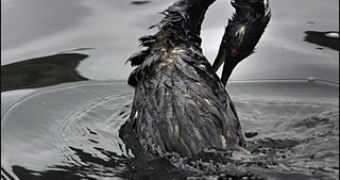Back in 2010, the Deepwater Horizon spill lead to massive amounts of petroleum being leaked into the Gulf of Mexico.
According to a new study, various bacteria that naturally inhabit these waters did a pretty good job in cleaning the spill to a certain extent, seeing how they consumed about 200,000 tons of oil and gas.
The researchers who looked into this issue explain that their findings, published in the journal Environmental Science and Technology, are of utmost importance for the management of potential future oil spills, as they bring forth a better understanding of how microorganisms living in natural ecosystems respond to such incidents.
Scientists explain how, in the aftermath of this incident, significant amounts of oil and gas ended up congregating about half a mile below the surface, and how the new layer formed in this manner was regarded by bacteria as a new all-you-can-eat buffet.
E! Science News quotes John Kessler from the University of Rochester, who made a case of how, “A significant amount of the oil and gas that was released was retained within the ocean water more than one-half mile below the sea surface.”
Furthermore, “It appears that the hydrocarbon-eating bacteria did a good job of removing the majority of the material that was retained in these layers.”
What is even more interesting is that, according to this study, having dispersants added to the spill seems to have caused an increase in the bacteria's appetite for oil and gas.
As John Kessler puts it, “While there is still much to learn about the appropriateness of using dispersants in a natural ecosystem, our results suggest it made the released hydrocarbons more available to the native Gulf of Mexico microorganisms.”
For the time being, it is still unclear why it is that the bacteria decided to put an end to their feast only five months after they first began binging down oil and gas.
Just for the record, bacteria use oxygen and release carbon dioxide both whenever they eat oil and gas, and when they die so, in the end, surrounding aquatic ecosystems have their natural balance significantly disturbed.

 14 DAY TRIAL //
14 DAY TRIAL //